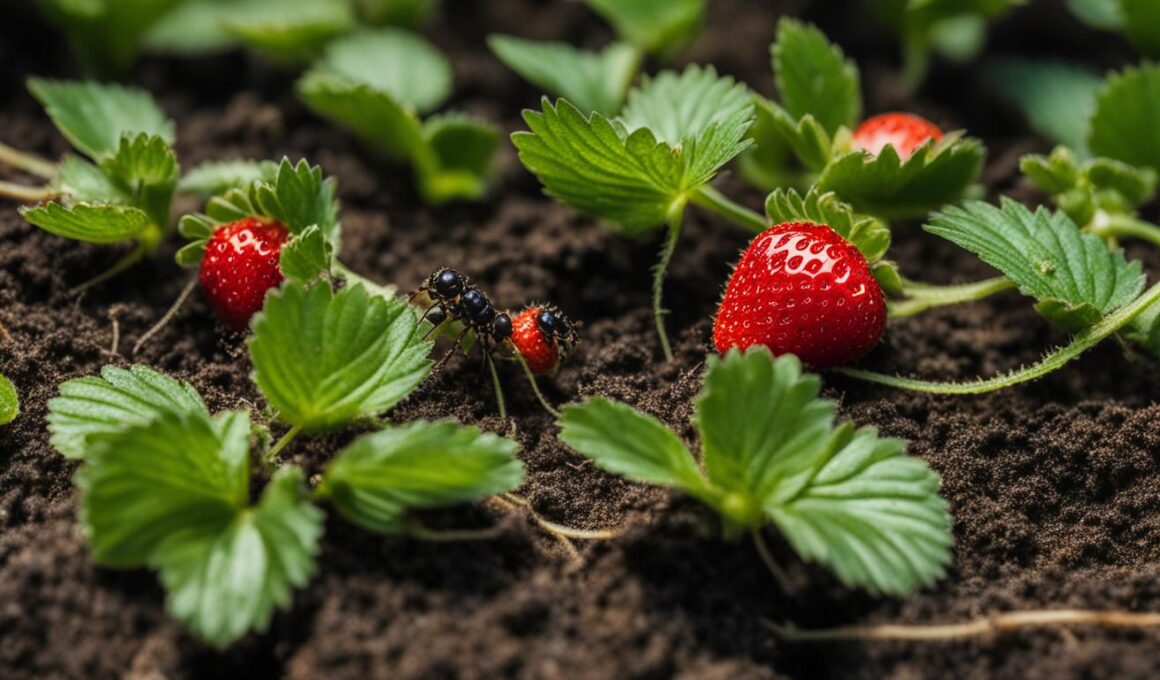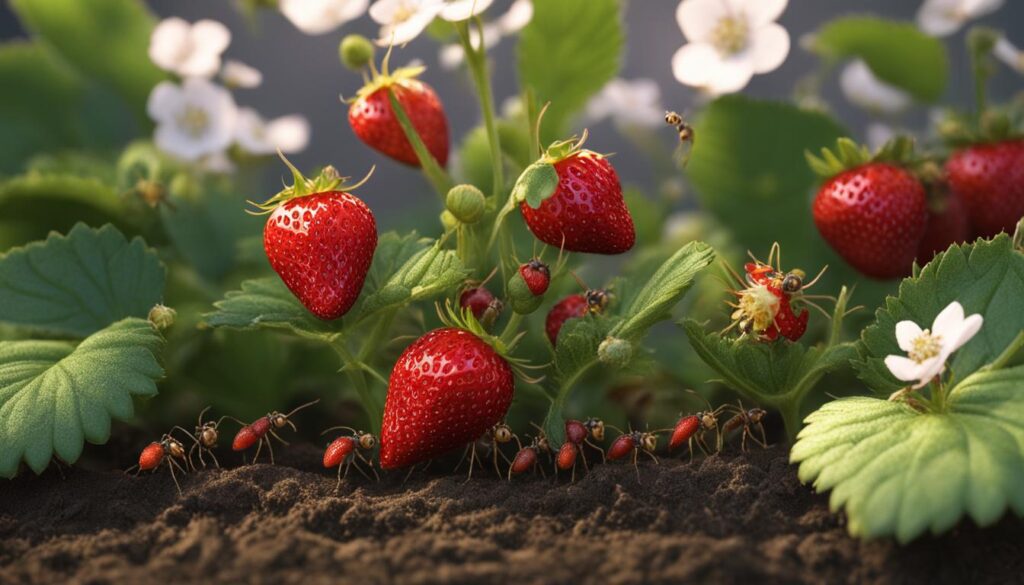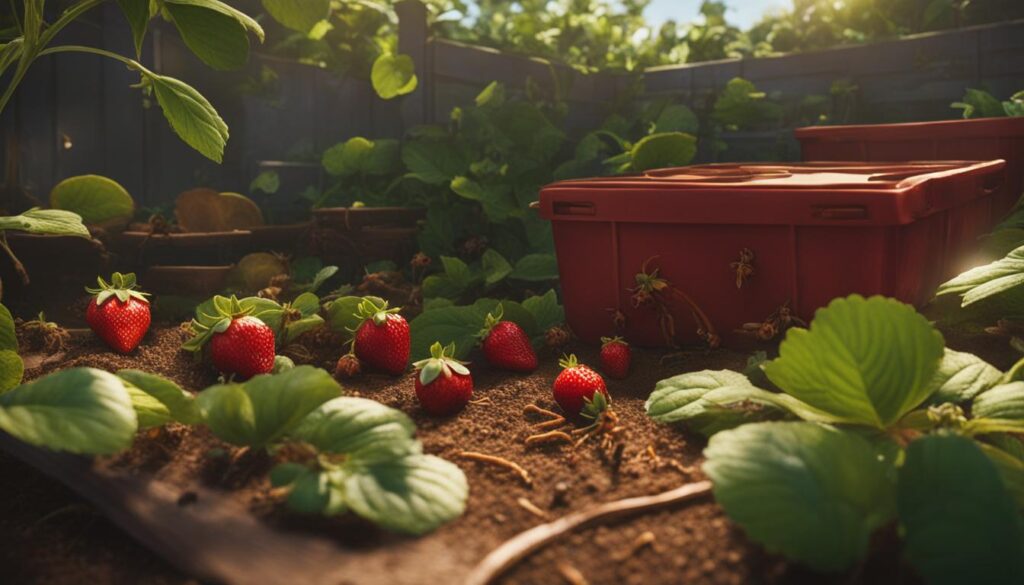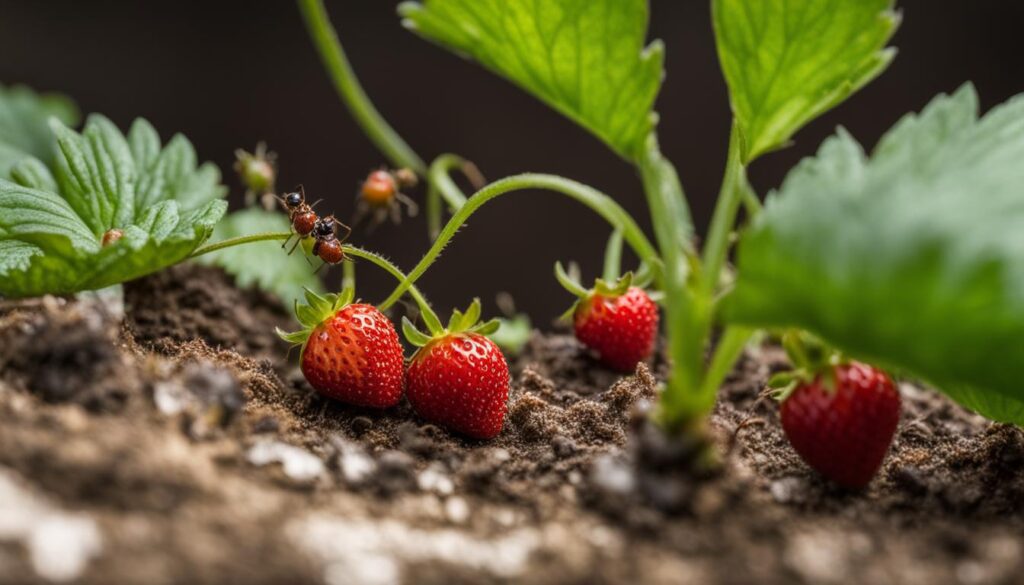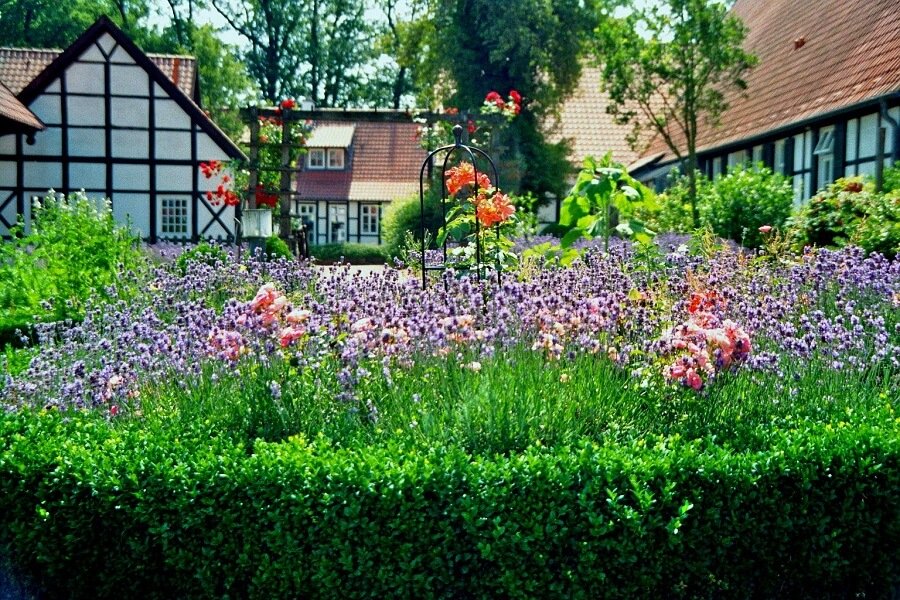If you’re a gardener, you may have noticed ants crawling around your strawberry plants. But are these tiny creatures actually harmful? In this article, we’ll explore the relationship between ants and strawberry plants, and whether or not they pose a threat to your crop.
Ants are often attracted to strawberry plants due to the presence of other insects such as scale insects, aphids, or mealy bugs. While ants themselves do not harm the plants, they can indicate the presence of these pests. To control ants, it is important to check your strawberry plants for signs of infestation and take appropriate measures for insect control if necessary. Sprinkling salt around the base of the plants or planting Pennyroyal nearby can also deter ants. Additionally, using bait stations or applying Tui Strawberry Food can help manage ant activity.
So, the presence of ants on your strawberry plants is not necessarily a cause for concern. By understanding their behavior and taking necessary steps for insect control, you can ensure the health of your strawberry crop.
Post Summary
- Ants are not harmful to strawberry plants but may indicate the presence of other pests.
- Check for signs of infestation and use appropriate insect control measures if necessary.
- Using deterrents like salt or Pennyroyal can help deter ants from strawberry plants.
- Bait stations or Tui Strawberry Food can be effective in managing ant activity.
- Observing ants and understanding their behaviors can help maintain a healthy garden environment.
The Role of Ants in the Garden
Ants play a crucial role in the garden ecosystem. While they may not be a problem for most gardeners, it is important to understand the benefits they provide. One of the key contributions of ants in the garden is soil aeration. As ants build their nests, they create tunnels that help to loosen and aerate the soil. This improves the soil structure, allowing roots to penetrate more easily and enhancing overall plant growth.
In addition to soil aeration, ants also aid in controlling pest populations. They collect dead insects, which helps to keep the garden free from potential pests. Ants are especially beneficial in managing the population of small insects like aphids. They may even farm aphids for their honeydew, allowing for a natural form of pest control.
Ants can benefit the garden by adding air to the soil through their nests, which helps with soil aeration.
The Importance of Ants in the Garden Ecosystem
It is important to recognize that ants are an integral part of the garden ecosystem. They contribute to the overall health and balance of the garden by assisting in nutrient cycling and decomposition. Ants help break down organic matter, releasing nutrients back into the soil. They also aid in the dispersal of seeds, contributing to the natural regeneration of plants in the garden.
| Benefits of Ants in the Garden | Methods of Control |
|---|---|
| Aids in soil aeration | Check for signs of other insects |
| Controls pest populations | Use appropriate insect control products |
| Assists in nutrient cycling | Sprinkle salt or plant Pennyroyal as deterrents |
| Contributes to seed dispersal | Utilize bait stations or apply Tui Strawberry Food |
By understanding and appreciating the role ants play in the garden, gardeners can coexist with these insects and maintain a healthy and thriving garden environment.
Types of Ants and Their Behaviors
Ants are fascinating creatures with a wide variety of species, each exhibiting its own unique behaviors and characteristics. Understanding the different types of ants can help you better manage and control them in your garden. Here are some common types of ants and their behaviors:
1. Fire Ants
Fire ants are known for their painful bites and stings. They build large nests in the soil and can be aggressive when their colony is threatened. Fire ants are an invasive species and can cause damage to plants and animals in their surrounding areas.
2. Carpenter Ants
Carpenter ants are larger ants that excavate wood to build their nests. They can cause damage to wooden structures in your garden or home. Carpenter ants are often attracted to damp or decaying wood and are commonly found near water sources.
3. Argentine Ants
Argentine ants are small, brown ants that form extensive colonies. They are known for their rapid reproduction rates and can quickly dominate an area, displacing native ant species. Argentine ants are attracted to sweet foods and are often found near aphid-infested plants.
4. Pavement Ants
Pavement ants, as their name suggests, build their nests in cracks and crevices in pavement and sidewalks. They are small, brown ants and are often seen foraging for food in your garden. Pavement ants are known for their scavenging behavior and will eat a wide variety of food sources.
| Ant Type | Behaviors |
|---|---|
| Fire Ants | Painful bites and stings, aggressive behavior |
| Carpenter Ants | Excavate wood, damage wooden structures |
| Argentine Ants | Rapid reproduction, attraction to sweet foods |
| Pavement Ants | Build nests in pavement, scavenging behavior |
“Understanding the behaviors of different ant species is essential for effective ant control in your garden. By identifying the types of ants present, you can tailor your control methods to target their specific behaviors and preferences.”
It is important to note that these are just a few examples of the many ant species you might encounter in your garden. Each species has its own behaviors and preferences, so it is crucial to identify the specific type of ant before implementing any control methods. By understanding the behaviors of different ant species, you can make informed decisions about how to manage and control them in your garden environment.
Comparison of Natural Remedies for Ant Control
| Remedy | Description | Effectiveness | Precautions |
|---|---|---|---|
| Borax | A mineral that acts as a bait and disrupts ants’ digestive systems | Effective against certain ant species | Keep out of reach of children and pets |
| Diatomaceous Earth | A powder that cuts into ants’ exoskeleton, causing dehydration | Effective against crawling insects, including ants | Use caution to avoid inhalation and eye contact |
| Cinnamon | A natural repellent that disrupts ants’ communication and navigation | May deter ants, but effectiveness varies | Use in areas where ants are entering, but avoid contact with plants or sensitive surfaces |
Controlling Ants with Nematodes and Boiling Water
If you’re dealing with an ant infestation in your garden, you may have come across suggestions to use nematodes or boiling water as control methods. While these methods are often mentioned, it is important to consider their effectiveness and suitability for the specific ant species you’re dealing with.
Nematodes are tiny worms that are sometimes used as biological controls for pests. Some gardeners have suggested using nematodes to target ant larvae in nests. However, there is limited scientific evidence to support the effectiveness of nematodes in controlling ants. It’s important to research and consult with experts to determine if nematodes are a suitable option for your specific ant problem.
Another commonly mentioned method for ant control is boiling water. The idea behind this method is that pouring boiling water directly onto ant nests or colonies can disrupt their activity and potentially eliminate them. While this may work in some cases, it often only provides temporary relief as ants may simply relocate to a different area of your garden.
In summary, while nematodes and boiling water are frequently mentioned as potential solutions for ant control, it is important to consider their effectiveness and suitability for your specific situation. Doing thorough research and consulting with professionals can help you make informed decisions on how best to deal with ants in your garden.
| Nematodes | Boiling Water |
|---|---|
| Limited scientific evidence to support effectiveness | Might only provide temporary relief |
| May not be suitable for all ant species | Affects only the ants directly exposed to boiling water |
| Requires research and consultation with experts | Ants may relocate to a different area of the garden |
Observing Ants and Their Role in Nature
Ants are fascinating creatures that play an important role in the garden ecosystem. By observing their behavior, we can gain valuable insights into their interactions with other organisms and their impact on the environment. From their industriousness to their cooperative nature, ants have long been admired for their unique qualities. Ancient texts often mention ants as symbols of hard work and determination. In the garden, ants can be found going about their daily tasks, diligently scavenging for food and building intricate nests.
One of the key benefits of observing ants in the garden is gaining a deeper understanding of their symbiotic relationships with other insects. For example, ants may be found on plants that have aphid infestations because they farm aphids for honeydew. By studying this behavior, we can recognize the interconnectedness of different organisms in the garden and the delicate balance that exists. Ants also contribute to soil aeration through their nest-building activities, which helps improve the overall health of the garden ecosystem.
Furthermore, observing ants can provide insights into the strategies they employ for survival and resource acquisition. Ant colonies exhibit remarkable levels of organization and cooperation, allowing them to efficiently gather food and defend their territory. By witnessing these behaviors firsthand, we gain a greater appreciation for the complexity and adaptability of ant societies. These observations can also inspire us to find coexistence strategies rather than resorting to measures aimed at eliminating ants entirely.
In conclusion, observing ants in the garden offers a unique opportunity to witness the intricate workings of nature. By recognizing their role in the ecosystem, we can better appreciate their presence and seek to coexist harmoniously. Through careful observation, we can gain valuable insights into their behaviors, symbiotic relationships, and contributions to the garden ecosystem. So next time you spot ants scurrying about, take a moment to watch and learn from these fascinating creatures.
Dealing with Ants in Strawberry Pots
If you’ve noticed an ant infestation in your strawberry pots, there’s a simple and effective method you can use to regain control. By utilizing the drowning method, you can eliminate the ants without causing harm to your precious strawberry plants. Here’s how it works:
- Place your strawberry pots in a larger container filled with water, ensuring that the water level reaches just below the rim of the pots.
- Allow the pots to sit in the water for a period of time, typically around 20-30 minutes, allowing the water to wick up and drown the ants.
- After the designated time has elapsed, carefully remove the pots from the water and drain any excess water from the container.
This method is both safe for your strawberries and highly effective in eliminating ant infestations. The water will drown the ants without causing any harm to your plants, allowing you to regain control in a natural and environmentally friendly way.
In addition to utilizing the drowning method, it’s important to water your strawberry pots thoroughly from above. This will help settle the soil and fill in any pockets that may have been created by the ants. By combining these two methods, you can effectively manage and eliminate ants from your strawberry pots, ensuring the health and productivity of your plants.
| Pros of the Drowning Method | Cons of the Drowning Method |
|---|---|
| Efficient and effective in eliminating ant infestations | May require multiple treatments for severe infestations |
| Safe for strawberry plants and the environment | Does not address the root cause of the ant infestation |
| Easy to implement with minimal cost | Requires monitoring and regular maintenance |
“By utilizing the drowning method, you can eliminate ant infestations in your strawberry pots in a safe and effective manner. This method not only protects your strawberry plants but also helps maintain a healthy and productive garden.”
– Gardening Expert
Conclusion
In conclusion, ants are generally not harmful to strawberry plants. They are attracted to the plants due to the presence of other insects such as scale insects, aphids, or mealybugs. To control ants, it is important to check for signs of these insects on your strawberry plants and use appropriate insect control products if necessary. Alternately, you can try sprinkling salt around the base of the plants or planting Pennyroyal nearby to deter ants. Bait stations or applying Tui Strawberry Food can also help manage ant activity.
While ants may be an inconvenience, it is important to remember that they can actually benefit the garden. They help with soil aeration by adding air through their nests, and they also help control pest populations by collecting dead insects. Understanding the behaviors and characteristics of different ant species can help in finding the most effective methods of control.
As you manage ants in your garden, it is crucial to observe and appreciate their role in the ecosystem. By studying ants and their interactions with other organisms, we can coexist with them and maintain a healthy garden environment. So, embrace natural control methods, keep an eye on your strawberry plants, and enjoy the fascinating world of ants in your garden!
FAQ
Are ants harmful to strawberry plants?
No, ants are not harmful to strawberry plants. They are often attracted to the plants because of other insects like scale insect, aphids, or mealy bug that may be present. To control ants, check for signs of these insects on your strawberry plants and use an appropriate insect control product if necessary. Sprinkling salt around the base of the plants or planting Pennyroyal nearby can also deter ants. Additionally, using bait stations or applying Tui Strawberry Food can help manage ant activity.
Do ants benefit the garden?
Yes, ants are generally not a problem in the garden. They do not eat plants, except in very dry locations. In fact, ants can actually benefit the garden by adding air to the soil through their nests, which helps with soil aeration. They also help control pest populations by collecting dead insects. While some ants, like fire ants, can bite and sting, they are not typically a major concern in the garden.
What are some natural home remedies for ant control?
There are numerous natural home remedies that are often suggested for ant control. These include using substances like borax, diatomaceous earth, cinnamon, cornmeal, and vinegar. However, it is important to note that not all of these remedies have scientific evidence to support their effectiveness. Some may only repel ants, while others may actually kill them. It is recommended to test these remedies in a controlled manner to see which ones work best for the specific ant species present.
Can nematodes or boiling water be used to control ants?
While some gardeners have suggested using nematodes to control ants, particularly young ant larvae in nests, there is little scientific evidence to support their effectiveness. Boiling water is another method that is often mentioned, but it may only temporarily disrupt ant colonies and cause them to move rather than eliminate them completely. It is important to consider the specific ant species and their behaviors when choosing methods of control.
What is the role of ants in the garden?
Ants have been observed and admired for their industriousness and their role in the ecosystem. They have been mentioned in ancient texts and are often used as examples of hard work and cooperation. While some gardeners may want to get rid of ants completely, it is important to recognize that ants play important roles in the environment. Studying ants can provide insights into their behaviors and their interactions with other organisms in the garden.
How can I deal with ants in strawberry pots?
If ants have taken over strawberry pots, one effective method of control is to place the pots in a larger container filled with water for a period of time, allowing the water to wick up and drown the ants. This method is safe for the strawberries and can help eliminate the ant infestation. It is also important to water the pots thoroughly from above to help settle the soil and fill in any pockets created by the ants.
Can Bugs on Strawberry Plants Attract Ants?
Bugs on strawberry plants may indeed attract ants. Ants are often drawn to the sugary secretions left behind by aphids or other small insects on the plants. If you are looking for a solution, learning how to eliminate strawberry bugs is crucial to reduce the chances of attracting ants to your strawberry garden.





